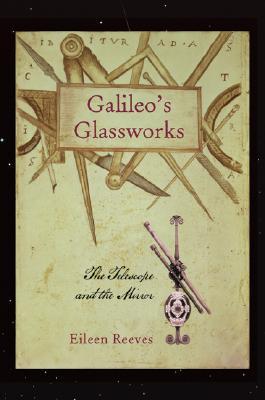Galileo's Glassworks (nonfiction): Difference between revisions
Jump to navigation
Jump to search
No edit summary |
No edit summary |
||
| Line 1: | Line 1: | ||
''Galileo's Glassworks'' is a book by Eileen Reeves | [[File:Galileo's_Glassworks.jpg|350px|thumb|Front cover of ''Galileo's Glassworks''.]]''Galileo's Glassworks'' is a book by Eileen Reeves about [[Galileo (nonfiction)|Galileo]] and the invention of the telescope. | ||
From the back cover: | From the back cover: | ||
| Line 6: | Line 6: | ||
The telescope was 'invented' in 1608. But what about the events leading up to it? Galileo and his contemporaries were searching for a device with which 'from an incredible distance we might read the smallest letters.' Eileen Reeves tells a story of 'cultural optics': magical mirrors and political intrigue, and investigators looking for magnifying power in all the wrong places, while the solution lay in the humble spectacle lenses on their noses. | The telescope was 'invented' in 1608. But what about the events leading up to it? Galileo and his contemporaries were searching for a device with which 'from an incredible distance we might read the smallest letters.' Eileen Reeves tells a story of 'cultural optics': magical mirrors and political intrigue, and investigators looking for magnifying power in all the wrong places, while the solution lay in the humble spectacle lenses on their noses. | ||
</blockquote> | </blockquote> | ||
It is published by Harvard University Press. | |||
== See also == | == See also == | ||
Revision as of 08:31, 6 November 2016
Galileo's Glassworks is a book by Eileen Reeves about Galileo and the invention of the telescope.
From the back cover:
The telescope was 'invented' in 1608. But what about the events leading up to it? Galileo and his contemporaries were searching for a device with which 'from an incredible distance we might read the smallest letters.' Eileen Reeves tells a story of 'cultural optics': magical mirrors and political intrigue, and investigators looking for magnifying power in all the wrong places, while the solution lay in the humble spectacle lenses on their noses.
It is published by Harvard University Press.
